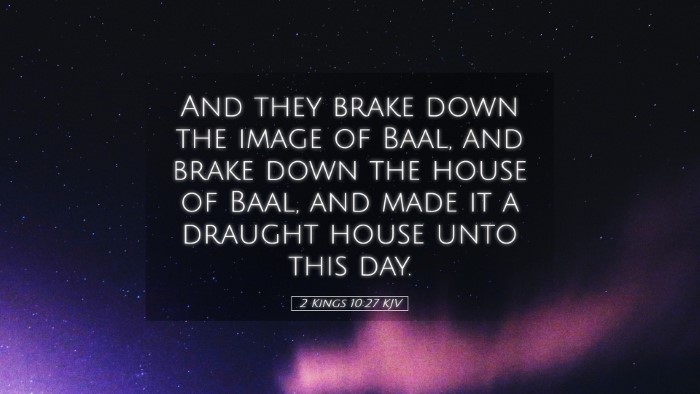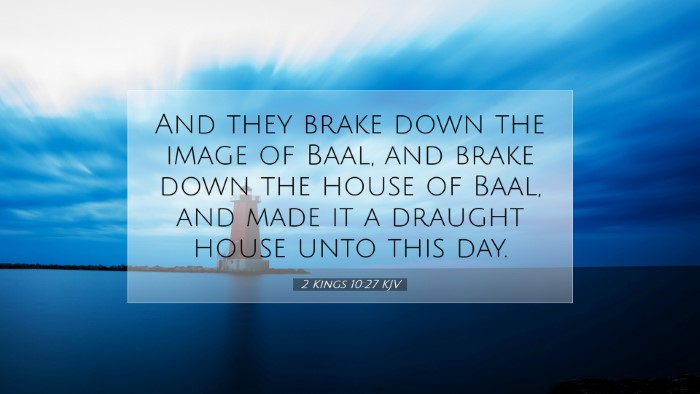Commentary on 2 Kings 10:27
Verse Context: 2 Kings 10:27 captures a crucial moment in the history of Israel during the reign of Jehu, who was anointed king to eradicate the house of Ahab and the worship of Baal. Following the destruction of Baal worshipers, Jehu not only aims to purify Israel but also to solidify his reign against any remnants of Ahab’s influence.
Text of 2 Kings 10:27
“And they brake down the image of Baal, and brake down the house of Baal, and made it a draught house unto this day.”
Commentary Insights
Historical Context
Jehu's rise to power was marked by decisive action against the idolatrous practices that plagued Israel. The mention of Baal worship throughout the biblical narrative serves as a backdrop to Israel's sin and subsequent judgment. This verse illustrates the culmination of Jehu's zealous reform. The act of destroying Baal's house symbolizes not only physical eradication but also a spiritual cleansing intended to bring Israel back to Yahweh.
Symbolism of Destruction
According to Matthew Henry, the destruction of Baal’s temple not only signals a victory over idolatry but also serves as a warning against the perils of syncretism. The act of turning Baal's temple into a latrine is emblematic of God's disdain for false worship. This transformation signifies that what once was esteemed and venerated is now regarded as utterly worthless and vile in the sight of God.
Theological Implications
Albert Barnes points out that this passage bears significant theological implications concerning God's sovereignty and the judgment of idolatry. The obliteration of Baal worship illustrates the lengths to which God will go to protect His name and His people’s faithfulness. This narrative serves as an admonition to contemporary believers about the dangers of idolatry, which may manifest in today’s society through the elevation of materialism and personal ambition over divine allegiance.
Practical Applications for Believers
- Examine Our Idols: Reflecting on the text, Adam Clarke encourages believers to examine the 'idols' present in their own lives. These idols may not be physical statues but rather priorities and attachments that distract from worshiping God wholeheartedly.
- Commitment to Purity: The removal of Baal worship echoes a call to purity for the church today. Jehu’s decisive actions motivate believers to boldly confront areas within their own lives and communities where idolatry may thrive.
- Understanding God's Judgment: The verse serves as a reminder that God’s judgment is not arbitrary; it is a response to the persistent rejection of His authority as seen in Israel’s history. Therefore, the faithful are encouraged to foster a culture of repentance and commitment to divine truth.
Conclusion
In summary, 2 Kings 10:27 not only narrates an event of destruction but exemplifies a greater spiritual truth regarding the nature of idolatry and God's relentless pursuit of holiness among His people. The insights drawn from Matthew Henry, Albert Barnes, and Adam Clarke converge on the theological and practical implications for the church today. Through this passage, we are reminded of the importance of rooting out falsehood and pursuing authentic worship that is aligned with the character of God.


